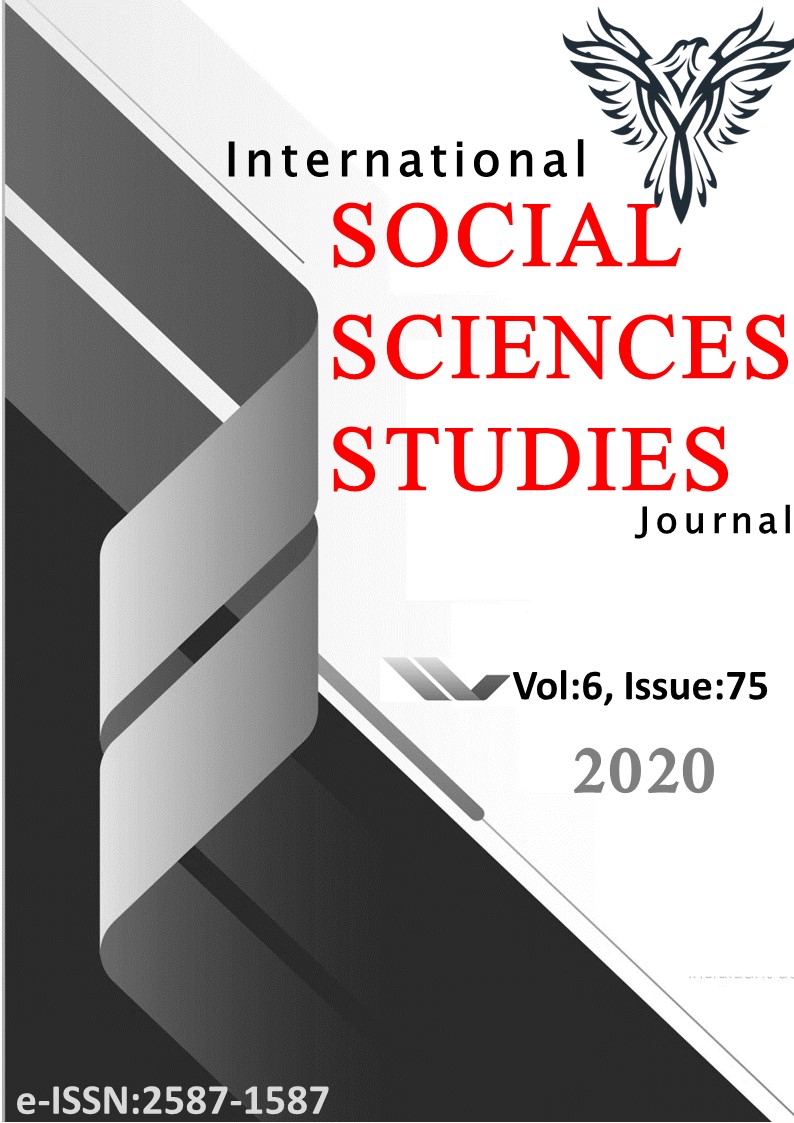OKUL ÖNCESİ DÖNEMDE ÇOCUKLARIN OYNADIĞI AKIL VE ZEKÂ OYUNLARININ PROBLEM ÇÖZME BECERİLERİ ÜZERİNDEKİ ETKİSİ
Author :
Abstract
Bu araştırmanın amacı, okul öncesi dönemde çocukların oynadığı akıl ve zekâ oyunlarının problem çözme becerileri üzerindeki etkisini incelemektedir. Araştırma 2019- 2020 eğitim-öğretim yılı içerisinde İstanbul ili Kağıthane ve Küçükçekmece ilçelerinde bulunan Millî Eğitim Bakanlığına bağlı devlet anaokullarında yer alan 60-72 aylık 29 çocuktan oluşmaktadır. Araştırmada nicel ve nitel yöntemler birlikte kullanılarak karma yöntem uygulanmıştır. Araştırmada nicel verileri toplamak amacıyla Oğuz ve Köksal Akyol (2012) tarafından geliştirilen Çocuklar İçin Problem Çözme Becerisi Ölçeği (PÇBÖ) kullanılmıştır. Deney grubuna dahil olan çocukların nitel verilerini toplamak için ise araştırmacı tarafından gerçekleştirilen “Yarı Yapılandırılmış Görüşme Formu” kullanılmıştır. Çalışmada 15 çocuk deney grubunu, 14 çocuk kontrol grubunu oluşturmuştur. Deney grubuna dahil edilen çocuklara araştırmacı tarafından 20 hafta süren toplam 100 saat akıl ve zekâ oyunları uygulanmıştır. Kontrol grubuna devam eden çocuklara Milli Eğitim Bakanlığı müfredatı uygulamaya devam edilmiştir. Araştırma bulgularına göre; akıl ve zekâ oyunları uygulamalarına katılan deney grubu çocukların, çocuklar için problem çözme beceri ölçeği puanları ile kontrol grubuna dahil edilen çocukların, çocuklar için problem çözme beceri ölçeği puanları karşılaştırıldığında deney grubu lehine anlamlı bir farklılaşma gözlemlenmiştir. Araştırmaya katılan deney grubu çocukların akıl ve zekâ oyunlarına yönelik görüşleri nitel olarak analiz edilmiştir. Araştırma sonunda akıl ve zekâ oyunlarının çocukların problem çözmede kullanılabilecek bir uygulama olduğu sonucuna varılmıştır.
Keywords
Abstract
This research aims to examine the impact of mind and intelligence games which is played by children during the pre-school period. The research contains 60-72 months old 29 children who are in public kindergartens locate in Kağıthane and Küçükçekmece in İstanbul. In this research by using quantitative and qualitative methods, a mixed-method has been applied. Problem-solving skills scale for children which is developed by Oğuz and Köksal Akyol (2012) to collect quantitative data in this research. To collect qualitative data of the children who are in the test group semi-structured interview form which is developed by the researcher has been used. In this research test group consists of 15 children and the control group consists of 14 children. 100 hours of mind and intelligence games has been applied by the researcher to the children in the test group for 20 weeks. Ministry of national education’s curriculum has continued to apply to the children in the control group. According to research findings; when problem-solving skill scale points of the children in the test group and problem-solving skill scale points of the children in the control group are compared differentiation which is in the advantage of the test group is observed. The opinion of the children in the test group has been qualitatively analyzed. At the end of the research, it was concluded that mind and intelligence games are a method that can be used in children's problem-solving.
Keywords
- Güngör, K. & Tuğrul, B.. (2020). “Okul Öncesi Dönemde Çocukların Oynadığı Akıl ve Zekâ Oyunlarının Problem Çözme Becerileri
- Üzerindeki Etkisi” International Social Sciences Studies Journal, (e-ISSN:2587-1587) Vol:6, Issue:75; pp:5550-5561 OKUL ÖNCESİ DÖNEMDE ÇOCUKLARIN OYNADIĞI AKIL VE ZEKÂ OYUNLARININ PROBLEM ÇÖZME BECERİLERİ ÜZERİNDEKİ ETKİSİ The Effect Of Mind Games That Preschool Children Play On Their Problem Solving Abilities Kadir GÜNGÖR İstanbul Aydın Üniversitesi, Lisansüstü Eğitim Enstitüsü, Okul Öncesi Eğitimi Ana Bilim Dalı, İstanbul/TÜRKİYE ORCID ID: https://orcid.org/0000-0001-7305-3128 Prof. Dr. Belma TUĞRUL İstanbul Aydın Üniversitesi, Eğitim Fakültesi, Okul Öncesi Öğretmenliği Bölümü, İstanbul/TÜRKİYE ORCID ID: https://orcid.org/0000-0002-4487-4514 ÖZET Bu araştırmanın amacı, okul öncesi dönemde çocukların oynadığı akıl ve zekâ oyunlarının problem çözme becerileri üzerindeki etkisini incelemektedir. Araştırma 2019- 2020 eğitim-öğretim yılı içerisinde İstanbul ili Kağıthane ve Küçükçekmece ilçelerinde bulunan Millî Eğitim Bakanlığına bağlı devlet anaokullarında yer alan 60-72 aylık 29 çocuktan oluşmaktadır. Araştırmada nicel ve nitel yöntemler birlikte kullanılarak karma yöntem uygulanmıştır. Araştırmada nicel verileri toplamak amacıyla Oğuz ve Köksal Akyol (2012) tarafından geliştirilen Çocuklar İçin Problem Çözme Becerisi Ölçeği (PÇBÖ) kullanılmıştır. Deney grubuna dahil olan çocukların nitel verilerini toplamak için ise araştırmacı tarafından gerçekleştirilen “Yarı Yapılandırılmış Görüşme Formu” kullanılmıştır. Çalışmada 15 çocuk deney grubunu, 14 çocuk kontrol grubunu oluşturmuştur. Deney grubuna dahil edilen çocuklara araştırmacı tarafından 20 hafta süren toplam 100 saat akıl ve zekâ oyunları uygulanmıştır. Kontrol grubuna devam eden çocuklara Milli Eğitim Bakanlığı müfredatı uygulamaya devam edilmiştir. Araştırma bulgularına göre; akıl ve zekâ oyunları uygulamalarına katılan deney grubu çocukların, çocuklar için problem çözme beceri ölçeği puanları ile kontrol grubuna dahil edilen çocukların, çocuklar için problem çözme beceri ölçeği puanları karşılaştırıldığında deney grubu lehine anlamlı bir farklılaşma gözlemlenmiştir. Araştırmaya katılan deney grubu çocukların akıl ve zekâ oyunlarına yönelik görüşleri nitel olarak analiz edilmiştir. Araştırma sonunda akıl ve zekâ oyunlarının çocukların problem çözmede kullanılabilecek bir uygulama olduğu sonucuna varılmıştır. Anahtar Kelimeler: okul öncesi dönem, akıl ve zekâ oyunları, problem çözme





